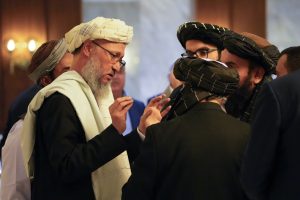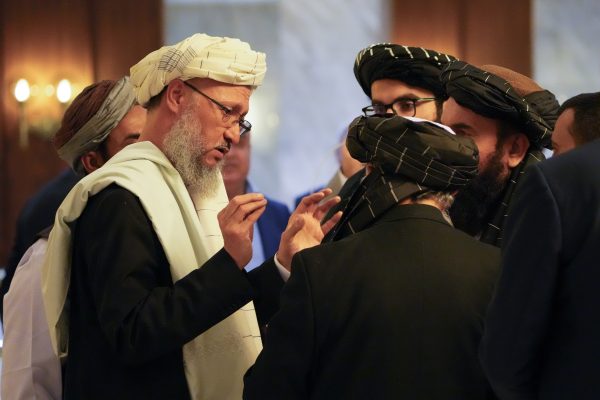
Abdul Salam Hanafi, a deputy prime minister in the Taliban’s interim government, left, speaks to members of his delegation during talks involving Afghan representatives in Moscow, Russia, Wednesday, Oct. 20, 2021.
Credit: AP Photo/ Alexander Zemlianichenko, Pool
Russia found a rare strategic opportunity to regain its foothold in Afghanistan as the United States withdrew forces and the Taliban took power in August 2021. This opportunity has, however, been squandered as Moscow dedicates nearly all its military muscle and strategic thinking toward the war in Ukraine. Russia’s policy toward the Taliban and Afghanistan today is inconsistent, to say the least. It is divided between trying to protect Russia’s security concerns and at the same time trying to placate the Taliban, as part of the nascent China-led effort to fill the vacuum left by the withdrawal of the United States and NATO.
The Taliban’s capture of power in August 2021 was a welcome event for the Russians. Reports suggest that Russian and Iranian funding and equipment helped the insurgents achieve their objective with breakneck speed. However, Moscow’s hope for the inclusion of Russian allies and proxies in Afghanistan in a coalition government headed by the Taliban was left unfulfilled. The faction-ridden Taliban held onto power, dismissing any prospects of including former President Hamid Karzai, deposed CEO Abdullah Abdullah, Ahmad Mashud, the Hazara groups, or the Tajik Jamiat-i Islami. In October 2021, Russian Foreign Minister Sergei Lavrov said Russia was withholding recognition from the Taliban until promises they made when they took power, including on the political and ethnic inclusivity of the new government, are fulfilled.
However, over the next couple of months, the Russians were forced to swallow the bitter pill and pursue their Plan B, i.e. doing business with the Taliban anyway. Not surprisingly, the Russian embassy in Kabul remained operational. In January 2022, along with Pakistan, Russia emphasized the need for “practical engagement” with the Taliban. In April 2022, Russia handed over the Afghan embassy in Moscow to the Taliban’s representatives.
It is apparent that Moscow was hoping to use its altered policy to entrench itself economically and strategically in Afghanistan, subject to the Taliban being able to prove themselves as able administrators of the country. It was also hoped that Taliban domination over the country would address Russia’s primary security concerns about the threat posed by al-Qaida and the Islamic State. On September 5, 2022, a suicide bomber belonging to the Islamic State Khorasan Province (ISKP) attacked the Russian embassy in Kabul, killing two employees and four Afghan civilians. Moscow found itself doing a reality check, yet again.
Diplomat Brief
Weekly Newsletter
N
Get briefed on the story of the week, and developing stories to watch across the Asia-Pacific.
Get the Newsletter
These frequent vacillations from hope to pessimism continue to characterize Russian policy toward Afghanistan. At one level, Moscow is aware of the chronic incapacity of the Taliban to govern the country and address most of its security concerns. The initiative toward building a regional approach to Afghanistan centered around terrorism concerns appears to be aimed at addressing the same. On another level, Russia’s preoccupation with Ukraine forces it to accept the Taliban as “an entity with no alternative.” Moscow recognizes that its transactional relationship with the Taliban must not be limited by the latter’s refusal to change either their worldview or their approach to governing the country.
On April 28 of this year, during the Shanghai Cooperation Organization (SCO) Defense Ministers’ Meeting in Delhi, Russian Defense Minister Sergei Shoigu highlighted the threats posed by armed groups based in Afghanistan to the Central Asian states. Calling upon the SCO members to increase coordination and joint efforts against terrorism, Shoigu said, “The probability of infiltration by gangs of various international terrorist organizations, such as ISIS, al-Qaida, the Islamic Movement of Uzbekistan, and the Islamic Movement of East Turkestan, is increasing.”
Taliban spokesperson Zabihullah Mujahid was quick to reject Shoigu’s statement. On April 30, he said, “Officials of the Russian Government should understand that in the last two years, there has been no threat from Afghanistan to the security of the countries of the region and world.” Taliban Foreign Minister Amir Khan Muttaqi, in February 2023, had made similar statements refuting Russian allegations that thousands of Islamic State militants have gathered in northern Afghanistan and threaten the stability of the Central Asian region.
Finding itself in a tight spot again, in May, Moscow invited a Taliban delegation to the Russia-Islamic World Economic Forum in Kazan. The delegation was led by Acting Industry Minister Nooruddin Azizi. On the sidelines of the meeting, the Taliban delegation discussed potential business and economic opportunities in Afghanistan with Russia and Organization of Islamic Cooperation (OIC) member states.
Advertisement
Russia’s dilemma in Afghanistan isn’t a unique phenomenon. Most regional countries face similar scenarios in the evolving new great game in Afghanistan. The lack of clarity on whether to shun or embrace the Taliban works to the advantage of the powers-that-be in Kabul. Instead of regional countries being able to pressure the Islamic Emirate, the Taliban have managed to incentivize engagement with it. As the game of Russian roulette plays out and stakes remain high, only lip service is paid to the goal of an inclusive government, and compulsive handshakes are clearly the norm of the day.

